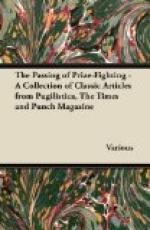NATIVE SWALLOWS.
A correspondent to one of the daily papers has remarked, that there is an almost total absence of swallows this summer in England. Had the writer been present at some of the election dinners lately, he must have confessed that a greater number of active swallows has rarely been observed congregated in any one year.
LORD MELBOURNE TO “PUNCH.”
My dear Punch,—Seeing in the “Court Circular” of the Morning Herald an account of a General Goblet as one of the guests of her Majesty, I beg to state, that till I saw that announcement, I was not aware of any other general gobble it than myself at the Palace.
Yours, truly, MELBOURN
* * * * *
A RAILROAD NOVEL
DEAR PUNCH,—I was much amused the other day, on taking my seat in the Birmingham Railway train, to observe a sentimental-looking young gentleman, who was sitting opposite to me, deliberately draw from his travelling-bag three volumes of what appeared to me a new novel of the full regulation size, and with intense interest commence the first volume at the title-page. At the same instant the last bell rang, and away started our train, whizz, bang, like a flash of lightning through a butter-firkin. I endeavoured to catch a glimpse of some familiar places as we passed, but the attempt was altogether useless. Harrow-on-the-Hill, as we shot by it, seemed to be driving pell-mell up to town, followed by Boxmoor, Tring, and Aylesbury—I missed Wolverton and Weedon while taking a pinch of snuff—lost Rugby and Coventry before I had done sneezing, and I had scarcely time to say, “God bless us,” till I found we had reached Birmingham. Whereupon I began to calculate the trifling progress my reading companion could have made in his book during our rapid journey, and to devise plans for the gratification of persons similarly situated as my fellow-traveller. “Why,” thought I, “should literature alone lag in the age of steam? Is there no way by which a man could be made to swallow Scott or bolt Bulwer, in as short a time as it now takes him to read an auction bill?” Suddenly a happy thought struck me: it was to write a novel, in which only the actual spirit of the narration should be retained, rejecting all expletives, flourishes, and ornamental figures of speech; to be terse and abrupt in style—use monosyllables always in preference to polysyllables—and to eschew all heroes and heroines whose names contain more than four letters. Full of this idea, on my returning home in the evening, I sat to my desk, and before I retired to rest, had written a novel of three neat, portable volumes; which, I assert, any lady or gentlemen, who has had the advantage of a liberal education, may get through with tolerable ease, in the time occupied by the railroad train running from London to Birmingham.




